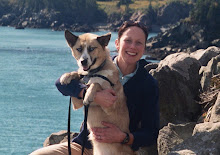
Inspired by Ari's encounter with the beaver, I find myself wanting my own moment of mindlessness. So the following Saturday, I load Ari into the car and we head to a popular trail one town over. It’s hard, though, to change your mindset in a moment, and I’m quickly frustrated. This trail has none of the charm of the beaver's pool. Instead of thick, undisturbed forest, we wander past brush and an absurd number of discarded appliances. I begin to count cedar trees and washing machines. The latter soon wins out. space—the kind of compromised landscape that exists on the margins of suburb and society. Sure, it has all of the accoutrements of wilderness—trees and insects, running water and blooming flowers, but they are dampened by the obvious presences of humans. A few candy and cigarette wrappers intermingle with golden rod; the sounds of the town raceway clog the air. I’m disheartened. Forget metaphysics; everything about this place is just plain physical—and of the most unimaginative kind.
Ari doesn’t seem to mind the human intrusion—in fact, as far as she’s concerned it just seems to add to the sensory overload of one of our walks. She races back and forth along the trail, trying to take it all in. As she does, she keeps her nose buried in the scents on the trail itself. I, too, forget to look upwards. But instead of taking in the scents, I seek further proof that we are not actually in a natural space. I am sulking; trying to find excuses to alienate myself from this place.
And just when I have convinced myself that we can find nothing wild in this landscape, I am stopped cold by a giant roar of water and wings. Ari and I both look out onto the stream, where an enormous bald eagle (Haliaeetus leucocephalus) is rising out of the current. The eagle is no more than twenty feet away from us, and its seven-foot wingspan seems more like seventy. The characteristic white cap and tail tells me that it is a sexually mature bird, but I can not determine the sex or age from where I stand. Frankly, I can’t do much of anything other than stare at this immense expanse of wing and life. In spite of Benjamin Franklin’s protestation that this is a bird of bad moral character, in spite of the overuse of the eagle for everything from homeland security to car dealerships, this is a hauntingly majestic animal—larger than life in every possible sense of the term.
Ari and I are both frozen—in shock or awe or reverence, I can’t tell—but we stay like that for quite some time, long after the eagle has risen above the canopy and out of sight, long after the sound of race cars once again seeps into our consciousness.
And that’s when it hits me: I am experiencing mindful communion. At least in the sense that I am utterly inside this bird as it rises from the water. Is this a sign? The fulfillment of a personal natural theology? Or is it just a coincidence of time and space—of eagle dinnertime and the noise of a clumsy hiker? I don’t know. I decide it doesn’t matter. For the first time since Cam’s death, I am rooted in the very best sense of the word. As the buzz of the racetrack returns, it somehow seems more distant, more muted than before. Nature—at least this time—has trumped culture. And a sense of wonder has replaced my feelings of loss. The pup and I are spellbound—weightless, almost. And we couldn’t be happier.


















0 comments:
Post a Comment